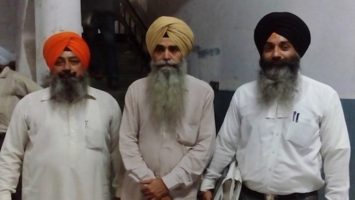JALANDHAR, Punjab—Sikh activist Bhai Daljit Singh Bittu and a UK citizen Jaswant Singh Azad were today acquitted in a case registered against them in 2012 under sections of Unlawful Activities Prevention Act (UAPA).



Sharing the development with Sikh24, Bhai Daljit Singh Bittu’s legal counsel Advocate Jaspal Singh Manjhpur informed that the Jalandhar police had registered an FIR No. 216/2012 under sections 10, 13, 17, 18-B, 20, 38, 39 & 40 of UAPA against UK citizen Jaswant Singh Azad in 2012. He added that later Bhai Daljit Singh Bittu was also framed in this case.
Advocate Jaspal Singh Manjhpur further said that the case was purely politically motivated and the Court found no evidence against the accused persons. He informed that such a case against Bhai Daljit Singh Bittu was also registered by the Ludhiana police in which he was later acquitted in May 2016. He added that this was the last case among 33 cases registered against Bhai Daljit Singh Bittu by the state in which he has been acquitted now.
He stated that the UAPA (after amendments of 2008 & 2012) was proxy of infamous acts like TADA & POTA which is being used by the state and police suppress rebel voices.
In 1967, India had introduced its first “Black Law”, known as the Unlawful Activities Prevention Act (UAPA), which allowed the State to curtail the following rights of citizens who it deemed were not acting in the national interest:
- Freedom of speech, and expression
- Right to assemble peaceably, and without arms
- Right to form associations, or unions
The Congress Party introduced the UAPA at a time when the State of India was in turmoil. Indira Gandhi’s grip on power was under threat. India had only just emerged from wars with both China, and Pakistan, the economy was in crisis, the political system was in crisis, and the Congress Party itself was in crisis. There were new strands of opposition emerging, and gaining in strength. The Congress Party could not see how to avoid their inevitable failure at the next election, so they created an atmosphere whereby, anyone who raised a voice was labelled as an enemy of the State, and then could be booked under the UAPA.
In 1985, the Terrorist and Disruptive Activities (Prevention) Act (TADA) was introduced, and used to suppress anyone who raised a voice against the Indian State’s actions, specifically in Punjab which gave wide powers to law enforcement agencies for dealing with so called ‘terrorists’. The Act was scrapped in 1995, but many Sikhs charged under the TADA still remain in prison today.
In 2002, India introduced the Prevention of Terrorism Act (POTA), and after strong opposition in 2004, the Indian parliament removed it. In 2004, the UAPA which still remains on the book of statutes, was given more bite. In 2008, and again in 2012, further amendments were made, which contain many of the provisions of POTA. Each time such Acts are introduced, the Government gives assurances that there are in-built safeguards against abuse, but given India’s abysmal human rights. record, their primary use is to target anyone who raises a legitimate voice against the activities of the Police, or the endemic corruption of Indian society.





[…] http://www.sikh24.com/2017/07/26/breaking-jalandhar-court-acquits-daljit-singh-bittu-in-a-case-regis… […]